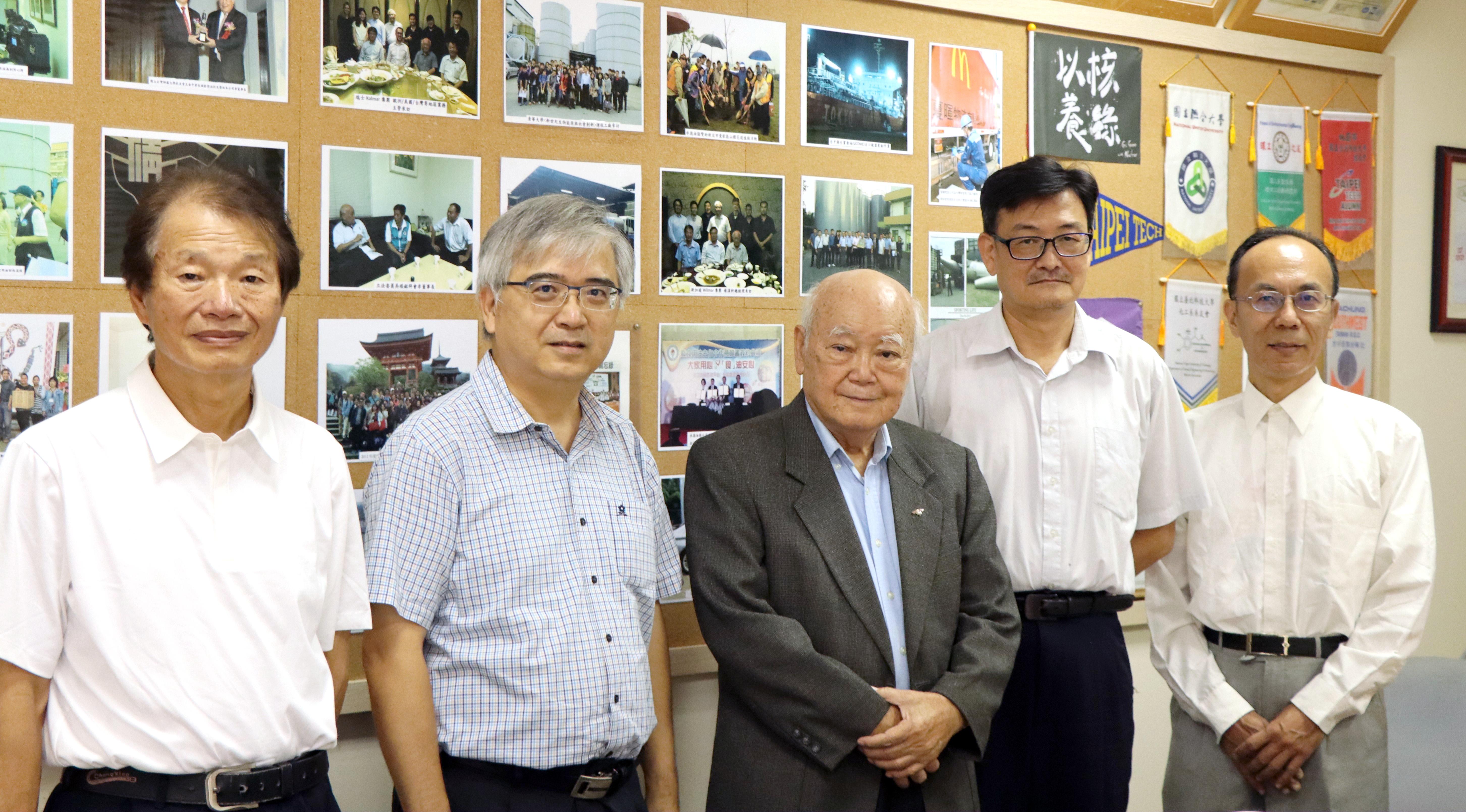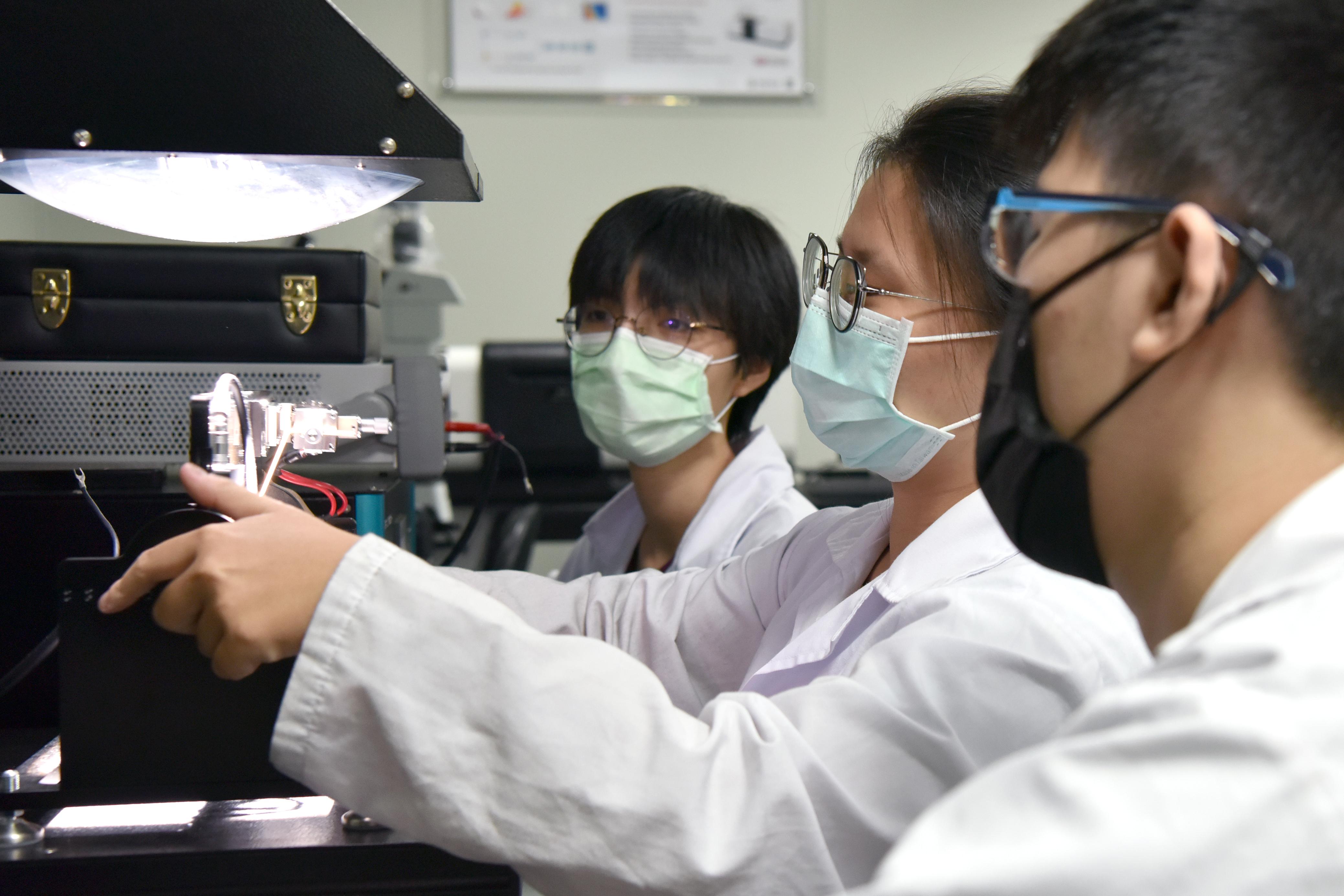
ENGINEERING A MIRACLE: TAIWAN’S GREEN ENERGY PIONEERS


ENGINEERING A MIRACLE: TAIWAN’S GREEN ENERGY PIONEERS

Cheng-Chih Wu President, National Taiwan Normal University
In recent years, we have seen an increasing frequency of disasters arising from extreme weathe r Gale-force winds, droughts, blizzards, heat domes and floods are just some of the “messages” that Mother Nature is sending us. Unfortunately, the severity of global warming now far exceeds the public ’ s understanding of its reach. As extreme weather becomes the norm, the development and use of green energy has become one of the cornerstones in the effort to alleviate global warming.
NTNU ’s R&D resources have joined with alumni business networks in the fields of energy and life sciences to develop a widely applicable green energy solution known as biodiesel. As the world faces an unprecedented crisis brought about by global warming, NTNU is mobilizing its reach in academia and business to cultivate a new generation of talent in the field of green energy. Together, we are working on creating a sustainable future—a future that belongs to all of us.
Publisher Cheng-Chih Wu
Publishing
National Taiwan Normal University
Editor-in-Chief
Frank Yung-Hsiang Ying
Editorial Board
Ying-Shao Hsu
Hsiang-Lin Liu
Chun-Chi Lin
Nikky Lin
Min-Ping Kang
Writers
Jeffrey Huang
Li-Ying Chang
Art Director
Ting-Ling Yu



NTNU alumnus Yi-Fa Lee leads the way in renewable energy.
Chant Oil transforms used cooking oil into high-quality biodiesel now sold internationally. Yi-Fa Lee has also promoted the use of biodiesel generators, echoing the government’s green policies and international energy trends.
Professor Guan-Chiun Lee uses genetic engineering to forward sustainable manufacturing.
Professor Guan-Chiun Lee, dean of the School of Life Science at NTNU, has used genetic engineering technology to create recombinant lipase, reducing the costs of biodiesel manufacturing.


Promoting R&D exchange between MIT and NTNU alumni-run enterprises.
The NTNU Global Research and Industry Alliance, as a member of the MIT-ILP (MIT Industrial Liaison Program), offers direction to Chant Oil regarding biodiesel trends and technology.
NTNU alumni cultivate new talent in the green energy industry.
Looking towards the development of the green energy industry, Yi-Fa Lee has donated to his alma mater for the establishment of related talent training programs.


As global emissions of carbon dioxide continue to rise, so does our plant’s temperature. Reflecting the severity of this issue has been the renewed focus on sustainable development at major international conferences. For its part, the International Energy Agency has set a date of 2050 by which carbon neutrality should be achieved, with renewable energy to replace all petrochemical energy sources.
Amid this energy revolution, countries worldwide have strengthened the research and promotion of green energy technology. In this issue of the NTNU Newsletter, our readers will learn of recent industry-academia collaborations between NTNU and its alumni in the field of green energy. And we hope they leave with a newfound appreciation of the field’s potential.
NTNU Department of Physics alumnus, Yi-Fa Lee, is the founder of Chant Oil, a pioneer green energy in Taiwan. Chant Oil manufactures high-quality biodiesel which has the potential to replace fossil fuels. Used in power plants or vehicles, biodiesel significant ly reduces carbon emissions and air pollution. With the assistance of researchers at NTNU, Chant Oil has also created an environmentally friendly biodiesel biocatalytic process by using genetic engineering to produce recombinant protease. Yi-Fa Lee has also invested plentiful resources to cultivate new talent in the field of green energy at his alma mater. Together NTNU and Chant Oil are working to make sustainable development—and its future applications—a reality we can all enjoy.

As the effects of global warming continue to worsen, in 2015, the UN released its 2030 Sustainable Development Goals (SDGs) , a blueprint for a more sustainable future. A collection of 17 interlinked global goals, the SDGs’ seventh goal is “to ensure access to affordable, reliable, sustainable, and modern energy for all.” The result of such efforts has been a veritable ‘green’ revolution across the globe.
Center among such energy trends has been the adoption of biodiesel, an area of fruitful cooperation between NTNU’s School of Life Sciences and alumni-run enterprises. Their development of high-quality, easily accessible biodiesel has made it an indispensable part of the world’s supply chain.
An alumnus of National Taiwan Normal University’s Department of Physics, Yi-Fa Lee is also the founder of Chant Oil, a pioneer in the green energy field. Over a decade ago, Chant Oil had already mastered the process by which discarded used cooking oil could be transformed into high-quality biodiesel. With results showing biodiesel’s excellent carbon reduction potential, Lee’s work attracted considerable interest in Europe.
Following a long-term collaboration with genetic engineering expert Professor Guan-Chiun Lee of NTNU’s School of Life Science, Yi-Fa Lee successfully produced a lipase enzyme that has improved the biodiesel production process—further reducing pollutants and costs and creating a more environmentally friendly biocatalytic process.

Chant Oil every year recycles close to 70,000 tons of used cooking oil, nearly 90% of what Taiwan disposes of yearly. On a small, two-hectare plant in New Taipei City’s Sanxia Industrial Park and Douliu Industrial Park, used cooking oil is converted into high-quality biodiesel using a chemical catalytic process and distillation technology.
With the maturity of its oil production technology and the scale under which it operates, Chant Oil’s success is currently unmatched by local companies. The quality of its biodiesel also exceeds that being produced in South Korea or China. The company’s international market presence continues to grow. Last year alone, the company exported 60,000 tons of biodiesel to Europe, with England’s BP Amoco, Royal Dutch Shell, and Spain’s Cepsa among major customers. Currently, Chant Oil creates over NTD 1.5 billion (USD 53 million) in value yearly.

Yi-Fa Lee graduated from NTNU’s Department of Physics in 1961. In 1970, he founded Chant Oil Ltd., which focused on the manufacturing and sale of oleochemicals. Early on, Chant Oil supplied animal and vegetable fatty acids, while continuing to develop soap, glycerol, paraffin wax, and other chemicals. A decade ago, the company partnered with the government’s bioenergy policies to begin manufacturing high-quality biodiesel. Today it is Taiwan’s largest biodiesel supplier with factories in Taipei’s Sanxia and Yunlin’s Douliu.

“The oil used in McDonalds, KFC, Mos Burger and many other restaurants is the raw material for biodiesel,” explains Chant Oil founder, Yi-Fa Lee. The current process is to first remove any water and impurities from the cooking oil before introducing a methanol reaction.
A caustic alkali is used as a catalyst to speed up the transesterification of methanol and oil and transform the oil into fatty acid methyl ester (otherwise known as biodiesel) and glycerol. As a last step, the biodiesel is distilled under high vacuum and high temperature to create a clear, high-quality biodiesel free of impurities.
hydroxide & Methanol

Used cooking oil (left) undergoes transesterification to become undistilled biodiesel (middle). A distillation process is then used to remove remaining impurities in the biodiesel (also known as ‘used cooking oil fatty acid methyl ester’).
Transesterification
Distilled biodiesel can be mixed with fossil diesel fuel or can replace it completely. Biodiesel can be used in diesel vehicles or power generators. Because it does not contain sulfides, aromatic hydrocarbons, or heavy metals, biodiesel burns much cleaner. No black exhaust is produced, greatly reducing carbon emissions and pollution.
According to the EPA, using biodiesel reduces particulate matters (PM) by 47%, carbon monoxide by 48%, cancer causing polycyclic aromatic hydrocarbons by more than 80%, and air pollution sulfides by 100%. “Working towards energy savings and carbon reduction is vital,” says Mr. Lee. “Using 50 to 60 thousand tons of biodiesel a year can reduce carbon dioxide emissions by up to 150-160 thousand tons a year, significantly improving air quality.”

According to projections by the International Energy Agency (IEA), the use of petrochemicals worldwide should be phased out and completely replaced by renewable energy sources in order to bring global carbon dioxide emissions to net zero by 2050. Here in Taiwan, the government has set a policy target of 20% of total electricity produced from renewable sources by 2025. It has also stipulated that large enterprises must receive 10% of their electricity from renewable sources by 2025. In addition to wind and solar power, whose benefits are familiar to many, biodiesel has great potential to help the government and companies meet these green energy goals.
Yi-Fa Lee explains that current solar and wind power technology still suffers from restrictions on power generated. As both wind and solar are affected by weather conditions, the amount of power they produce is unstable. Biodiesel, on the other hand, doesn’t suffer from the vagaries of the weather and the raw materials for biodiesel—used cooking oil or imported non-edible vegetable oil—are easily acquired. Biodiesel can be used in oil-fired power plants or the power generation facilities of individual enterprises to help them achieve an easily adjustable, controllable, and stable power supply.
At present, there are mature diesel engine power generators that can operate on 100% biodiesel, including the Fri-El Acerra power plant in Italy and Japan’s Sankei Fukuchiyama biomass power plant. Companies can also use biodiesel in their emergency diesel power generators, helping them to immediately meet governmental green energy requirements. Yi-Fa Lee believes that biodiesel has much to offer in the worldwide push towards green energy. Used in tandem with solar and wind power, biodiesel can help make green energy policies a reality and help Taiwan catch up with trending transformations in energy.

The oil and alcohol reaction through an enzyme catalysis leads to transesterification and the production of fatty acid methyl ester and glycerol.
The use of enzymes as a catalyst has in many ways revolutionized the biodiesel production process by greatly lowering production costs. Professor Guan-Chiun Lee, dean of NTNU School of Life Science, has long been involved in developing enzyme applications for biodiesel production. Using gene modification technology, the genetically engineered lipase (enzyme) can be expressed in yeast. Lipase can replace the original caustic alkali in the transesterification process and can be used with both discarded cooking oil and non-edible oil to manufacture biodiesel. Catalytic enzymes also have the added benefit of reducing both costs and waste products in the

According to Professor Lee, the genetically engineered lipase (enzyme) in yeast was originally derived from lipase secreted by a specific fungus. However, since the fungus is not easily cultivated, the lipase gene was implanted into the yeast strain P. pastoris. Taking advantage of the rapid reproduction of P. pastoris, a large amount of recombinant lipase is able to be secreted. This method allows for lower enzyme production costs, the independent production of enzymes, and optimization of enzyme functions.
Yeast Recombinant Protein Expression System:
Following advances in recombinant DNA techniques, there has been a gradual development of different host cells through which to express these diversified recombinant proteins. Foreign genes are transferred into a viable cell where they use the cell as a factory for recombinant protein production, a process called protein expression system. Due to the high-value and low-cost of the system, the active manufactured protein can be used in medicine, food, chemicals, etc. For example, protein drugs can be used to regulate the pathogenic mechanism of disease or offer other contributions to clinical medicine and research.
P. pastoris is widely used in production of recombinant proteins. This yeast expression system is better than insect or mammalian cells in that it reproduces rapidly and can be easily genetically manipulated; thus, it is an excellent expression host for recombinant proteins. At present, more than a hundred recombinant proteins have been successfully expressed with P. pastoris . However, not all recombinant proteins are expressed in a high level, and the expression levels between different genes vary considerably. Therefore, the question of how to increase the expression level of foreign genes in P. Pastoris has become an area of important research.
(Excerpt from: “Establishment of a Pichia pastoris System to Highly Express Recombinant Protein” 2013)
Professor Lee emphasizes that, compared to using a caustic alkali as a catalysis, enzymes offer many advantages including safer use, lower energy consumption, good reaction efficiency, a wide range of oil feedstocks, simple reaction conditions, and easy separation between product and by-products. Furthermore, the use of enzymes means avoiding wastewater treatment problems that come bundled with the use of caustic alkali as a catalyst.
Professor Lee has also worked on genetically engineering of Candida rugosa lipase secreted by Candida rugosa . Using P. pastoris in the expression of recombinant lipase, he has successfully triggered transesterification with the non-edible Jatropha curcas seed oil to produce biodiesel. Professor Lee intends to apply this technology to the production of biodiesel in industrial quantities. Summing up the process, he states: “Using enzymes in the conversion process of cheap non-edible oils is the inevitable evolution of the future production of biodiesel.” Currently, Chant Oil is building a continuous experimental plant at its Sanxia factory with a slated yearly production capacity of 30,000 tons. It expects that the new enzyme technology will be put into production by year’s end.

Lipases are an important group of versatile enzymes in the field of biotechnology. They have been widely used in food, medicine, detergents, chemical products, and oil industries. The secretory lipase of non-sporogenic Candida rugosa has a broad substrate specificity. It is an important industrial enzyme and is widely used in the field of biotechnology.
The secretory lipase contains a mixture of lipase isoenzymes ( CRLs),which have different catalytic properties. Five CRL genes (LIP1 to LI P5) have been identified and successfully expressed i n P. pastori s These recombinant isoenzymes exhibit distinct substrat e preferences and catalytic activities.The study shows that recombinant CRL2 exhibits superior catalytic efficiencies for producing fatty acid methyl ester (FAME) from Jatropha curcas seed oil. A maximum 95.3% FAME yield has been achieved by using CRL2 under the optimal conditions. Our conclusion is that specific recombinant CRL isoenzymes could be an excellent biocatalyst for biodiesel production from low-cost crude Jatropha oil.
(Expert from: “Enhanced Expression of Recombinant Candida rugosa Lipase 2 in Pichia pastoris and its Application in Biodiesel Production” 2015)
Professor Guan-Chiun Lee
Guan Chiun Lee is professor and dean of the School of Life Science at NTNU. His fields of research include biochemistry, microbiology, protein engineering, and enzyme biotechnology. For many years, Professor Lee has studied enzyme and protein engineering, using this research to develop specific recombinant lipases in the production of biodiesel. In recent years, his research has expanded to the area of Alzheimer’s treatment. One of Taiwan’s most successful researchers, many of Professor Lee’s projects are currently being patented in the US and Taiwan and he has been involved in many industry-academia collaboration projects.


This year, Chant Oil and NTNU signed a memorandum of understanding giving Chant Oil access to information released by the US-based MIT Industrial Liaison Program (ILP) of which NTNU is a member. Across a host of collaboration mechanisms, NTNU senior industry liaison experts will break down for Chant Oil the latest research coming out of the Massachusetts Institute of Technology (MIT). Areas such as biodiesel manufacturing, carbon footprint reduction, industry-academia collaboration, making the traditional oil processing industry greener, and technical cooperation in the production and preparation of recombinant lipase are just some of the topics in which NTNU is to serve as a conduit of technology between MIT and Chant Oil.
Both sides hope that this plan to improve biofuel-related technology will assist Taiwan’s numerous SMEs with maintaining their technological edge through the necessary upgrades and transformations, and to effectively combine the foresight of academic R&D with the innovation of future product cycles.
This May, NTNU invited Chant Oil to participate in a sustainable development seminar jointly organized by MIT and National Taiwan University. Studying sustainable development from various angles, as well as offering insight into MIT’s efforts and success in the field, the seminar was a boon for local companies, such as Chant Oil, who are working towards implementing more policies in the direction of sustainable development.
The transition towards renewable energy is an inevitable trend of the future. For its part, Taiwan looks to use green energy to drive scientific and technological innovation and research, as well as local employment opportunities. It hopes to continue to cultivate new talent in the green energy industry and strengthen the development of related domestic industries. Along those lines, Chant Oil and NTNU will launch a new industry-academia collaboration project in the field of green energy on September 1. The project is slated to run until January 31, 2022 and will offer training courses at NTNU’s Undergraduate Program of Vehicle and Energy Engineering on the use of biodiesel power generation systems.
The curriculum will cover a deep dive into the characteristics of biodiesel, the principles of engine structure, and various maintenance procedures. As part of their training, students will visit Chant Oil to learn first-hand on how to operate generators running on biodiesel, as well as how they connect to an electric grid. A host of extracurricular opportunities will also be available. For example, using a comprehensive vehicle testing flowchart, students will be asked to conduct an analysis on
energy consumption, cost, and long-term operational component degradation between two control groups—one using 100% biodiesel and the other using fossil fuels. After recording data and results, students will be asked to offer further ideas for research and discussion.
Professor Yi-Hsuan Hung, Director of the Program of Vehicle & Energy Engineering, says that the five-month industry-academia collaboration will prepare students to use classroom knowledge into real-world solutions. Thanks to the program’s emphasis on practical experience, participating students will have a solid foundation of applicable skills and entrepreneurship know-how upon graduation.
At the conclusion of the five-month project, a detailed report on the performance and environmental sustainability of generators running on 100% biodiesel will be submitted to the relevant government agencies to be used as a reference in their revision of renewable energy policies promoting the most promising and stable green energy solutions.

Professor Yi-Hsuan Hung
Yi-Hsuan Hung is a Distinguished Professor and Director of the Program of Vehicle & Energy Engineering. His research fields include design and modeling of electric vehicles, advanced vehicle control strategy and energy management technology, and new energy applications. Professor Hung was the 2014 recipient of Society of Automotive Engineers “Education Achievement Award for Vehicle Engineering” and served as director of the three-year Ministry of Education’s Industrial Innovation Program (2018-2021). He has also established NTNU’s first start-up: NeoPower Technologies Co., Ltd.
In addition to biodiesel, solar cells have become another focus of developmental projects worldwide thanks to their dropping costs and environmental and economic benefits. Solar cells also mark another area of cooperation between Chant Oil and NTNU. At the start of 2019, Yi-Fa Lee contacted Professor Chih-Ta Chia, former dean of the College of Science at NTNU, about the possibility of setting up a new degree program. Thanks to a subsequent donation by Yi-Fa Lee, the Solar Energy Engineering Program at NTNU was born. Cutting-edge laboratory equipment was also donated by Mr. Lee, which can now be found in NTNU’s newly opened Laboratory for Principles and Practices of Solar Cells.
Curriculum content of the Solar Energy Engineering Program includes courses on optoelectronic semiconductors, solid state physics, novel solar power materials, solar cells, and solar power engineering. Many of these courses include a lab component, allowing students to complement their textbook learning with hands-on experience. Professor Chih-Ta Chia believes that, at its core, the solar photovoltaic industry is based on physics and engineering, with potential applications covering a variety of electronic and circuit designs. Drawing from NTNU’s strong physics and engineering departments and solid research foundations, the Solar Energy Engineering Program is poised to become Taiwan’s premier program for the development and training of experts in solar power R&D and technology.

Taiwan, along with the rest of the world, is facing the effects of climate change brought about by the greenhouse effect. With its green energy industry still far from mature, Taiwan currently depends on imports for 98% of its energy needs and relies heavily on petrochemical energy sources.
Partnering with NTNU in a series of industry-academia collaboration projects, Chant Oil hopes to leverage industry-relevant technology and academic R&D to continue to widen both domestic and foreign green energy tech pipelines, foster new talent in the green energy industry, and fulfill its civic duty in the joint promotion of the sustainable development of global energy.

Professor Chih-Ta Chia
Chih-Ta Chia is a NTNU Professor of Physics and has served as the dean of the NTNU College of Science from 2013-2016. His areas of research include Raman spectroscopy, spectroscopy of semiconductor materials, and spectroscopy of photorefractive crystals. Professor Chia has long emphasized physics education in Taiwan and has actively promoted various physics debate competitions. His team of young physicists from Taiwan have won silver three times at The International Young Physicists’ Tournament.





